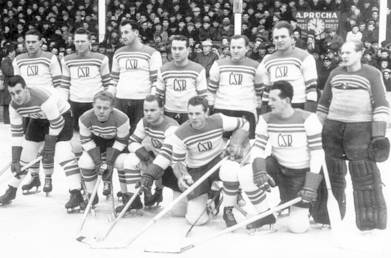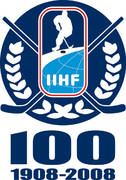

Story #48 Czechoslovakian team jailed for treason – entire generation lostMarch 11, 1950 – Prague, Czechoslovakia
Czechoslovakia was the best national team in the world in the years following World War II. The team won the 1947 and 1949 World Championships and lost the 1948 Olympic gold to Canada only on goal differential.  Yes, there had been earlier defections by Czechoslovakian hockey players to the west, but none of the accused players had ever seriously considered taking this step, although they had their chances. They could have stayed in Sweden after the 1949 World Championship or in Vienna where they prepared for the 1950 event in London. The players, of course, pleaded not guilty. About the Top 100 StoriesAs part of the IIHF's 100th anniversary celebrations, www.IIHF.com is featuring the 100 top international hockey stories from the past century (1908-2008). Starting now and continuing through the 2008 IIHF World Championships in Canada, we will bring you approximately three stories a week counting down from Number 100 to Number 11.
The Final Top 10 Countdown will be one of the highlights of the IIHF's Centennial Gala Evening in Quebec City on May 17, the day prior to the Gold Medal Game of the 2008 World Championship.
These are the criteria for inclusion on this list: First, the story has to have had a considerable influence on international hockey. Second, it has to have had either a major immediate impact or a long-lasting significance on the game. Third, although it doesn't necessarily have to be about top players, the story does have to pertain to the highest level of play, notably Olympics, World Championships, and the like. The story can be about a single moment — a goal, a great save, a referee's call — or about an historic event of longer duration — a game, series, tournament, or rule change. |
 Click here for the 100 Top Stories
|
|






